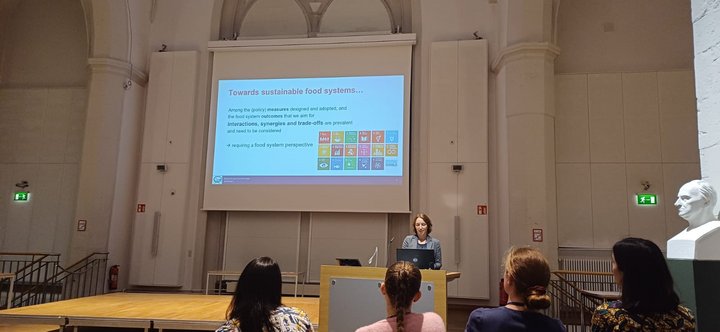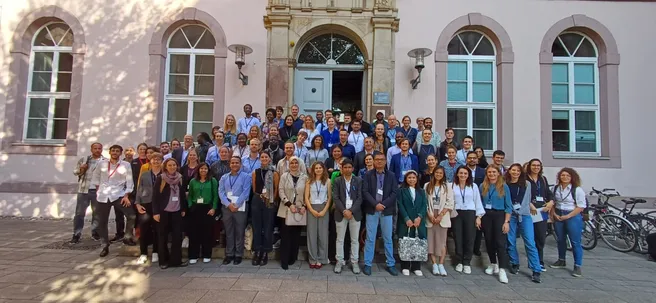Keynote Presentations
A major highlight of the symposium was the lineup of distinguished keynote speakers, each providing unique perspectives on how to address the complex challenges in global food systems. Among them were:
- Rob Vos, Unit Director at IFPRI (Markets, Trade, and Institutions), who delivered an insightful presentation on Options for Reducing GHG Emissions from Agriculture and Food Systems.
- Danielle Resnick, Senior Research Fellow at IFPRI (Development Strategies and Governance), spoke on the Political Dynamics that Shape Food System Policies, emphasizing the trade-offs that certain policies might entail.
- Klaus Grunert, Professor in the Department of Management at Aarhus University, presented on Perspectives for Behavioral Change Towards a Healthier and More Sustainable Diet.
- Sanchayan Banerjee, Assistant Professor at the Amsterdam Sustainability Institute (Vrije Universiteit Amsterdam), discussed Behavioral and Economic Policies for Sustainable Dietary Transitions.
- Agnes Quisumbing, Senior Research Fellow at IFPRI (Poverty, Gender, and Inclusion), spoke on Measurement Challenges in the Gender and Food Systems Framework and the development of the WEAI (Women’s Empowerment in Agriculture Index).
- Ferne Edwards, Research Fellow at the Centre for Food Policy (City, University of London), highlighted innovative Urban Food Actions and Initiatives that are leading the transformation of food systems.
Key Themes and Discussions
The symposium provided a comprehensive platform to explore several interrelated themes crucial to achieving a sustainable food system. Key topics of discussion included:
- Ecolabeling and Consumer Behavior: Ecolabeling, which provides information on the environmental impact of food products, has gained traction as a tool to influence consumer choices. Research presented at the symposium explored how different types of ecolabels affect consumer preferences and how they can encourage shifts towards more sustainable consumption patterns.
- Climate Change Adaptation and Mitigation: Agriculture is both a victim and a contributor to climate change. Several presentations highlighted innovative adaptation and mitigation strategies, ranging from changes in farming practices to technological innovations, aimed at reducing agriculture’s carbon footprint while enhancing resilience to climate shocks.
- Food Security and Supply Chains: Ensuring equitable access to nutritious food remains a critical global challenge, particularly as supply chains are increasingly strained by environmental degradation, geopolitical conflicts, and market disruptions. Discussions revolved around the need for resilient, flexible, and equitable food supply chains that can withstand these pressures.
Shinuna Gärtner’s Research on Urbanization and Diets in Tanzania
Shinuna Gärtner presented her ongoing research on the Effects of Urbanisation on Diets in Tanzania, offering a unique perspective on how rapid urban growth is influencing dietary patterns in one of Africa’s fastest-growing nations.
Drawing on data from the National Panel Survey of Tanzania, which tracks socioeconomic and demographic factors as well as household diets, Gärtner’s research examines how increasing urbanization is changing food environments and influencing the types of foods people consume. Her work aims to identify the specific dietary shifts associated with urbanization, including the consumption of processed foods, fast foods, and foods prepared away from home, all of which have been linked to rising rates of obesity and non-communicable diseases in urban populations.
By using longitudinal data and geospatial information, Gärtner is able to track not only changes in diets over time but also how these changes correspond to shifts in the physical and socioeconomic environment.
Her presentation also touched on broader public health concerns, such as the rising rates of obesity, diabetes, and cardiovascular disease in Tanzania, and raised important questions about how policymakers can intervene to promote healthier, more sustainable diets in rapidly urbanizing regions.
Looking Forward
The symposium at Göttingen has set a strong foundation for future research and action in the field, serving as a critical platform for generating the ideas and collaborations needed to move towards a more equitable and sustainable food system.



